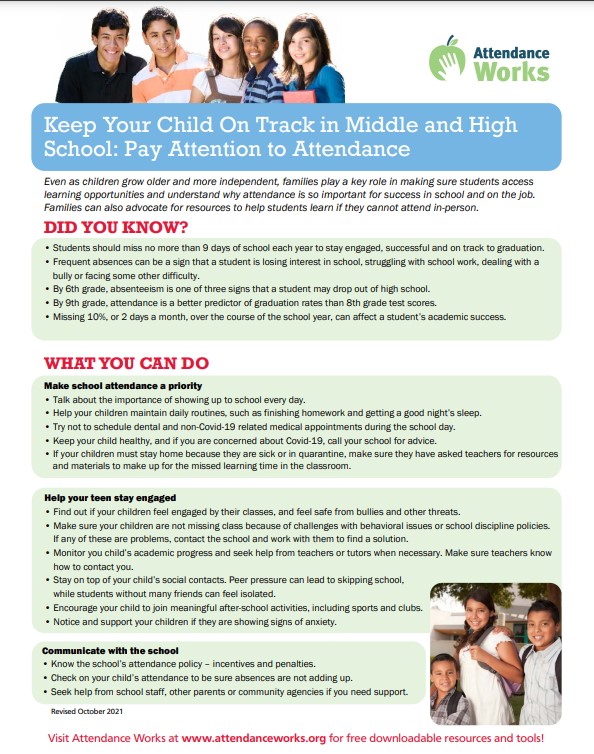Keep Your Child On Track in Middle and High School: Pay Attention to Attendance
Even as children grow older and more independent, families play a key role in making sure students access learning opportunities and understand why attendance is so important for success in school and on the job. Families can also advocate for resources to help students learn if they cannot attend in-person.
DID YOU KNOW?
• Students should miss no more than 9 days of school each year to stay engaged, successful and on track to graduation.
• Frequent absences can be a sign that a student is losing interest in school, struggling with school work, dealing with a bully or facing some other difficulty.
• By 6th grade, absenteeism is one of three signs that a student may drop out of high school.
• By 9th grade, attendance is a better predictor of graduation rates than 8th grade test scores.
• Missing 10%, or 2 days a month, over the course of the school year, can affect a student’s academic success.
WHAT CAN YOU DO?
Make school attendance a priority
• Talk about the importance of showing up to school every day.
• Help your children maintain daily routines, such as finishing homework and getting a good night’s sleep.
• Try not to schedule dental and non-Covid-19 related medical appointments during the school day.
• Keep your child healthy, and if you are concerned about Covid-19, call your school for advice.
• If your children must stay home because they are sick or in quarantine, make sure they have asked teachers for resources and materials to make up for the missed learning time in the classroom.
Help your teen stay engaged
• Find out if your children feel engaged by their classes, and feel safe from bullies and other threats.
• Make sure your children are not missing class because of challenges with behavioral issues or school discipline policies. If any of these are problems, contact the school and work with them to find a solution.
• Monitor you child’s academic progress and seek help from teachers or tutors when necessary. Make sure teachers know how to contact you.
• Stay on top of your child’s social contacts. Peer pressure can lead to skipping school, while students without many friends can feel isolated.
• Encourage your child to join meaningful after-school activities, including sports and clubs.
• Notice and support your children if they are showing signs of anxiety.
Communicate with the school
• Know the school’s attendance policy – incentives and penalties.
• Check on your child’s attendance to be sure absences are not adding up.
• Seek help from school staff, other parents or community agencies if you need support.
Visit Attendance Works at www.attendanceworks.org for free downloadable resources and tools!





